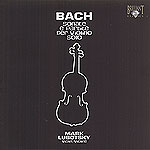Though there’s no mention of this in the notes, violinist Mark Lubotsky has been around for quite awhile and hardly can be described as a baroque specialist. As a childhood friend of the late modernist Alfred Schnittke Lubotsky premiered a number of the composer’s works, though he is arguably even more well known as a frequent collaborator with Benjamin Britten, whose violin concerto he recorded for Decca in 1970. Who knows what the circumstances were behind this 1987 recording of Bach’s Sonatas and Partitas for solo violin (originally made for Clavigram, with little circulation outside of Holland). Lubotsky’s performances, given the fierce competition and regardless of Brilliant Classics’ super-budget price, are going to be a tough sell.
As you might expect, Lubotsky takes a highly romanticized approach to these works, similar to other modern-instrument masters of his generation such as Arthur Grumiaux (Philips), Henryk Szeryng (Sony and Deutsche Grammophon), and Nathan Milstein (EMI and Deutsche Grammophon). For instance, slow movements tend to be very slow and fast ones very fast. Lubotsky occasionally pushes these extremes to new lengths at the expense of the musical line, ultimately sacrificing the shape of the movement as a whole–and trying the listener’s patience. For example, at nearly five minutes, Lubotsky’s performance of the opening Adagio of the first Sonata must be the slowest ever, surpassing those by all three of the above-mentioned artists. The same is notably true of the Sarabande and Tempo di Bourrée of the first Partita, the Allemande of the second Partita, the great fugue of the third Sonata, and the three minuets of the third Partita. Lubotsky not only plays slower, but he also has a tendency to unnecessarily dwell on ornaments and to be overly expressive with phrasing. By contrast, in the second-movement Double of the first Partita and in his relentlessly brazen rendering of the Bourée of the third Partita, Lubotsky performs as if these works were studies to hack away at rather than simply play. If it still matters, the sound is fine.
































